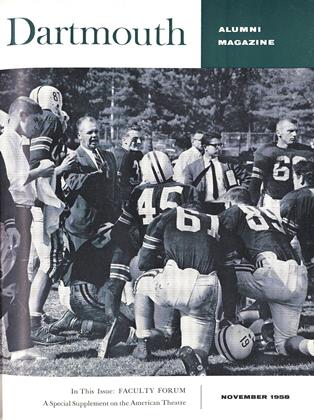Four tragedies translatedwith introductions by William Arrowsmith,John Frederick Nims, Richmond Lattimore'26, and Ronald Frederick Willetts. Chicago: University of Chicago Press, 1958.255pP. $3.95.
This volume is the seventh in the Chicago Press series of the "Complete Greek Tragedies" edited by David Grene and Richmond Lattimore '26. It contains the "Ion," a sceptical attack on traditional religious concepts, and Euripides' three war tragedies, "Hecuba," "Andromache," and "Trojan Women."
The three war plays, all dealing with the aftermath of the Greek expedition against Troy and all produced during the protracted struggle between Athens and Sparta at the end of the fifth century B.C., are passionate outcries against the brutalizing effect of war on those who are involved in it. "Hecuba" studies the process of moral deterioration which affects the victor as a result of the unrestrained exercise of power and the vanquished in his desire to retaliate against oppression. "Andromache" is an incisive condemnation of the military mind as typified by Sparta, that most militaristic of all Greek states, while the "Trojan Women" issues a solemn warning to the strong against arrogance and insensitivity.
The translations in this volume maintain the high standards set in the rest of the series. Two especially stand out, William Arrowsmith's vigorous, though somewhat free, "Hecuba" and Richmond Lattimore's accurate, restrained "Trojan Women." Mr. Lattimore again shows his remarkable ability to render faithfully the meaning of the Greek line in a natural English idiom which because of its simplicity often rises to real poetic beauty. Ronald Willetts' "Ion" is fresh and lively. Only John Frederick Nims' "Andromache" limps occasionally. It is at once too colloquial and too grandiloquent.
In a world grown accustomed to teetering on the brink and inclined to submerge consideration for the individual beneath the realities of impersonal politics these plays of Euripides are a timely reminder of the evils of war. They speak the more powerfully for the language of modern poetry into which they have at long last been translated.
 View Full Issue
View Full Issue
More From This Issue
-
 Feature
FeatureWhere Are the Silver Cornets? or Twenty Versts to Nizhni Novgorod
November 1958 By KENNETH ALLAN ROBINSON -
 Feature
FeatureHow Firm a Foundation?
November 1958 By PROF. HENRY B. WILLIAMS -
 Feature
FeatureFive Wishes for America
November 1958 By BENFIELD PRESSEY -
 Feature
FeatureA Community of Learning
November 1958 -
 Feature
FeatureDorms for Learning and Living
November 1958 By J. B. F. -
 Feature
FeatureClass of 1962
November 1958
Books
-
 Books
BooksFilms
JANUARY 1967 -
 Books
BooksNEW VALUES IN MUSIC APPRECIATION
February 1936 By D.E. Cobletgh -
 Books
BooksELECTRICAL UTILITIES
January, 1930 By H. S. Raushenbush -
 Books
BooksFor Robert Frost
MARCH 1963 By J. TERRY CORBET '62 -
 Books
BooksMASTER OF THE COURTS.
May 1974 By JOHN HURD'21 -
 Books
BooksTHE MONEY MARKET AND MONETARY MANAGEMENT.
MARCH 1965 By WILLIAM A. CARTER '20

